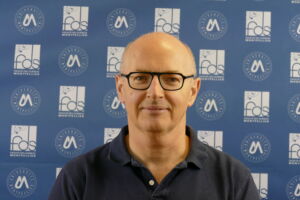Newsletter #8 Interview with Frédéric Lemoigno - LMD5
Implementation of LMD5 accreditation
(Interview with Frédéric Lemoigno, FdS Deputy Director in charge of LMD5)
Until 2020, at the Faculty of Science, the first year of the bachelor's degree was offered on the 2 Curie and Monod portals. From the start of the new academic year, the range of courses on offer will be adapts to the new secondary school audience, i.e. the first generation to experience the reform of the choice of specialties in the first and last years of secondary school.
adapts to the new secondary school audience, i.e. the first generation to experience the reform of the choice of specialties in the first and last years of secondary school.
A changing context, adaptable results,
The Faculty of Science has planned and adapted to this secondary school reform, which coincides with the implementation of our accreditation. Today, our component offers 5 portals to new baccalaureate holders: Computer Science, Maths and its Applications, PCSI, SVSE and TEE.
Indeed,computer science requireda specific pathway for young people wishing to choose this discipline, who often wish to specialize from the first year onwards. TheMathsand its applicationsportalisbased more on the study of mathematics, and is also aimed at future students of certain courses in physics and mechanics. ThePCSIportal is designed for those wishing to study the broad spectrum of engineering sciences. Backed by a solid mathematics curriculum, it will attract students interested in physics and chemistry, and will also enable them to discover other disciplines, such as EEA and mechanics, which are rarely taught in high schools. TheSVSE portaltakes over from the former Life Sciences portal, and will be the choice of those wishing to study biology, ecology and environmental sciences. As forTEE,this portal aims to attract students interested in earth sciences, integrating environmental aspects and water sciences, research themes that are very present in Montpellier.
Reflections, questions and remediation
All reforms bring with them questions and their share of uncertainties about the population (much less homogeneous than in the past), which is why most portals have included remedial and refresher TU in their mock-ups to help students in difficulty. If difficulties persist despite the help provided in the first semester, it will be possible to follow a specific course to strengthen one's "Parcoursup" file, if students agree that they have made a mistake in their choice and wish to reorient themselves. For others, the possibility of preparing for the first year of the bachelor's degree in 2 years, with special arrangements for subjects in which they have weaknesses, is also a possible alternative. In fact, tutoring will continue to be developed to support these various forms of remediation.
Masters reinvent themselves and evolve
Apprenticeships are growing in response to demand from companies and government incentives. Young people are attracted by a way of studying that puts them in touch with the world of work, and more courses are opening up to apprenticeship. Based on the model of theEnergy Master's program, which already offers multi-disciplinary training in chemistry, electronics and physics, new trans- or multi-disciplinary Master's programs will be launched at the start of the 2021 academic year, such as theWood Sciences Master's program, which will provide training in all aspects of the wood industry, from production to use. TheBio-informatics Master's degree also highlights its position between computer science and life sciences. As for theEco EPI(Eco-Epidemiology and Parasitic and Infectious Emergencies) Master's degree, this new course, which has a particular resonance at the moment, finds its place among the new courses.